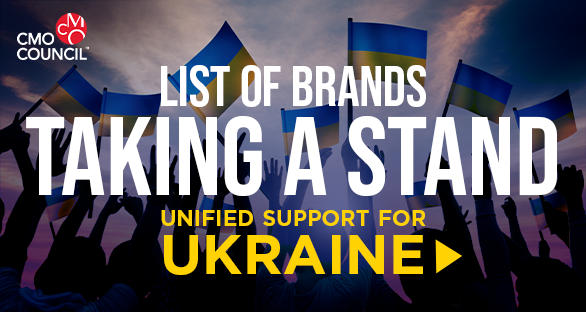BLOG POST

December 31, 1969
Brands Bucking Russia
The business world is angry, rightfully so, as countless innocent Ukrainians are dying and others fleeing, and Russian consumers are paying the price for Vladimir Putin’s invasion.
Hundreds of major brands are pulling out of Russia, while those few staying silent are drawing ire over social media. In a connected economy, where consumers hold sway, we’ve never seen anything like this: global companies weaponizing commerce in retaliation for bombs and bullets.
When the dust settles, what will remain of brands and business relations in Russia? Will this show of force abate future war mongering from despots and dictators? That’s a discussion for another time.
 What we can say today is, we’ve never felt more connected to our community of brand marketers who have been quick to make their positions known and put action behind their words. That’s why we’ve created a "List of Brands Taking a Stand," which will be updated weekly as long as this crisis continues.
What we can say today is, we’ve never felt more connected to our community of brand marketers who have been quick to make their positions known and put action behind their words. That’s why we’ve created a "List of Brands Taking a Stand," which will be updated weekly as long as this crisis continues.
Not long after Putin invaded Ukraine, and the unwillingness of the United States and others to engage a nuclear aggressor militarily, big brands took up the mantel. BP was Russia’s largest foreign investor and led the boycott by announcing exit plans late last month.
One by one, companies weighed in.
On the heels of Russia’s new “fake news” law meant to silence the truth, media and advertising companies began cutting ties. TikTok suspended live streaming. In defiance of Russian law, Netflix stopped broadcasting 20 state-run propaganda channels in Russia. Twitter, Meta and YouTube restricted ads and other content from Russian state media. London-based advertising group WPP ceased operations in the country.
Household consumer brands jumped into the fray, too. Apple, Samsung Electronics, Nike, Under Armour, JD Sports, Hennes & Mauritz, Hermes International, Boohoo, Asos, Chanel, Kering, Swarovski, LVMH, Marks & Spencer, Inditex, Electronic Arts, IKEA and others closed stores, stopped shipments or paused sales in Russia. Entertainment giants Disney, Sony, Paramount, Universal Pictures and WarnerMedia also pulled planned movie releases.
Strangling Russia’s supply chain, half of the world’s container ships will no longer go to and from the country, roiling trade in everything from food and metals to clothes and electronic goods, Bloomberg reports. FedEx and UPS suspended shipments into Russia. Visa, Mastercard and American Express halted transactional services.
For big consumer brands still standing on the sidelines, public condemnation has been swift. Hashtags #BoycottMcDonalds and #BoycottCocaCola began trending on Twitter. Not long after, McDonald’s said it would temporarily close all 847 restaurants in Russia, and Coca-Cola halted operations there.
B2B companies are also making their feelings felt. Among enterprise tech giants, Microsoft, Oracle, Dell and Adobe halted operations or suspended new sales in Russia. Big consultancies, such as KPMG, Deloitte, PwC, EY and McKinsey, are leaving. BP, Shell and Exxon have withdrawn from Russia, pulling billions of dollars in investments.
Brands around the world are overtly expressing their affinity with the Ukrainian people and denouncing the Russian invasion in many material ways. While Russian consumers (many protesting the war) and business interests will suffer, the Ukrainian nation will take much comfort from the power of brand purpose to help repulse Russia’s “shock and gore” offensive.
Brands now have a new playbook for combatting conflict instigators. Let’s hope many more global stakeholders show the courage and conviction needed to curtail human suffering and Russia’s relentless push for territorial, political and economic gain. Here’s a shortlist of possible ways to bait and cage the bear:
• Shutting down operations or divesting business interests/partnerships/joint ventures
• Ending trade, distribution, and customer support agreements
• Blocking essential supplies and technology for military purposes
• Restricting delivery of essential critical components and systems
• Eliminating marketing spend in Russian media and retail channels
• Reducing the purchase and consumption of Russian goods worldwide
• Adding complexity and cost to all Russian business, trade, investment and spend
• Rolling back product distribution and promotion in Russia
• Discouraging outsourcing and tech transfer with Russia interests
• Cancelling any Russian-related sports sponsorships and competitions
• Negating the availability of entertainment content and experiences
Donovan Neale-May
Executive Director

Donovan Neale-May is the Founder and Executive Director of the CMO Council, the Growth Officer Council (www.growthguidancecenter.com), and the Business Performance Innovation (BPI) Network (www.bpinetwork.org), a global community of executive change agents driving business reinvention, IT transformation, and process improvement across the enterprise.
Please login to join the discussion
Comments
No comments yet.
